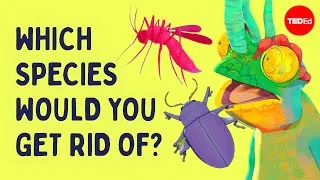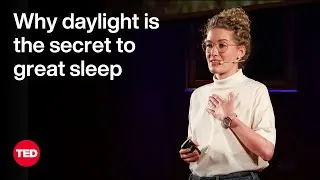請雙擊下方英文字幕播放視頻。
譯者: Ting-Yen Tsai
審譯者: Helen Chang
「此刻,神經科學正經歷一場革命」
──《大腦的未來》(2014)
00:07
This pencil-eraser-sized mass of cells
is something called a brain organoid.
0
7108
5849
這一團橡皮擦大小的細胞
被稱為「類腦器官」
00:12
It’s a collection of lab-grown neurons
and other brain tissue
1
12957
4032
它是實驗室培養出來的神經元
和其他大腦組織的集合體
00:16
that scientists can use to
learn about full-grown human brains.
2
16989
4361
科學家可以透過它
來研究發展完全的人類大腦
00:21
And it can be grown from
a sample of your skin cells.
3
21350
4880
而且它可以由你身上的
皮膚細胞培養而來
00:26
Why would we need such a thing?
4
26230
2089
為什麼我們需要這麼一個東西呢?
00:28
Neuroscientists face a challenge:
5
28319
2151
因為神經科學家面臨一個問題:
00:30
shielded by our thick skulls and
swaddled in layers of protective tissue,
6
30470
4269
由於在厚厚的頭骨保護下
又被多層保護組織包覆
00:34
the human brain is
extremely difficult to observe in action.
7
34739
5090
在活體情況下觀察人類的大腦十分困難
00:39
For centuries, scientists have tried to
understand them using autopsies,
8
39829
4392
好幾世紀以來,科學家
已經嘗試透過解剖屍體、
00:44
animal models,
9
44221
1009
動物模型、
00:45
and, in recent years, imaging techniques.
10
45230
3137
還有近年來開始使用的
成像技術來瞭解大腦
00:48
We’ve learned a lot through
all these methods,
11
48367
2264
我們透過這些方法已經有很多發現
00:50
but they have limitations.
12
50631
1790
但它們仍有侷限
00:52
Conditions like Alzheimer’s
and schizophrenia,
13
52421
2271
像是阿茲海默症和精神分裂症等疾病
00:54
and the effect on
the human brain of diseases like Zika,
14
54692
3849
還有對於人腦產生影響的惡疾
例如茲卡病毒
00:58
continue to hide beyond our view,
and our understanding.
15
58541
4740
我們依然看不見、不理解
01:03
Enter brain organoids,
which function like human brains
16
63281
3780
如同人腦一般運作的類腦器官
01:07
but aren’t part of an organism.
17
67061
2225
不是生物體的一部分
01:09
Each one comes from
an undifferentiated stem cell,
18
69286
3426
它們來自尚未分化的幹細胞
01:12
which is a cell that
can develop into any tissue in the body,
19
72712
3889
也就是可以發展成從骨頭到大腦
01:16
from bone to brain.
20
76601
1836
任何身體組織的細胞
01:18
Scientists can make undifferentiated
stem cells from skin cells.
21
78437
5139
科學家可以從皮膚細胞中
製造出尚未分化的幹細胞
01:23
That means they can take a skin sample
from a person with a particular condition
22
83576
4031
這代表他們可以從有某特定症狀的人
身上提取一個皮膚細胞樣本
01:27
and generate brain organoids
from that person.
23
87607
3808
來培養那個人的類腦器官
01:31
The hardest part of growing
a brain organoid,
24
91415
2835
培養類腦器官最困難、
01:34
which stumped scientists for years,
25
94250
1994
令科學家困擾多年的部分是
01:36
was finding the perfect combination of
sugars, proteins, vitamins, and minerals
26
96244
5199
找到由糖、蛋白質、維他命
和礦物質組成的完美比例
01:41
that would induce the stem cell
to develop a neural identity.
27
101443
4410
去誘導幹細胞發展為神經細胞
01:45
That was only discovered recently,
in 2013.
28
105853
3259
這一直到最近的 2013 年才被發現
01:49
The rest of the process
is surprisingly easy.
29
109112
2842
至於剩下的步驟則出奇簡單
01:51
A neural stem cell essentially
grows itself,
30
111954
3080
因為神經幹細胞可以自行成長
01:55
similar to how a seed grows into a plant,
31
115034
2679
就像一粒種子長成一棵植物
01:57
all it needs are the brain’s equivalents
of soil, water, and sunlight.
32
117713
4279
它只需要大腦的「泥土、水和陽光」:
02:01
A special gel to simulate
embryonic tissue,
33
121992
2531
一種可以模擬胚胎組織的特殊膠
02:04
a warm incubator set at body temperature,
34
124523
2561
一個溫度設定在體溫的培養器
02:07
and a bit of motion to mimic blood flow.
35
127084
2839
還有一些模仿血液流動的輕微晃動
02:09
The stem cell grows into
a very small version
36
129923
2669
這些幹細胞會長成
02:12
of an early-developing human brain,
37
132592
2502
一個處於發展前期人腦的迷你版
02:15
complete with neurons that can connect
to one another
38
135094
2490
擁有可以互相連結溝通的神經元
02:17
and make simplified neural networks.
39
137584
3130
並且組成簡單的神經網絡
02:20
As mini brains grow, they follow
all the steps of fetal brain development.
40
140714
5361
這個迷你大腦將會
循著胚胎大腦發展的所有步驟
02:26
By observing this process,
we can learn how our neurons develop,
41
146075
3951
經由觀察這個過程
我們就能瞭解神經元是如何發展的
02:30
as well as how we end up with
so many more of them in our cortex,
42
150026
3730
以及我們的大腦皮層中
最後怎麼會有這麼多的神經元
02:33
the part responsible for higher cognition
like logic and reasoning,
43
153756
3998
讓我們所擁有的
邏輯思考能力之類的感知能力
02:37
than other species.
44
157754
2023
比其他物種更好
02:39
Being able to grow brains in the lab,
even tiny ones,
45
159777
2941
但是能夠在實驗室裡培養「大腦」
即使是迷你版的
02:42
raises ethical questions, like:
46
162718
2307
也產生了一些道德問題,例如:
02:45
Can they think for themselves,
or develop consciousness?
47
165025
3401
它們能否獨立思考或是發展意識呢?
02:48
And the answer is no, for several reasons.
48
168426
3337
答案是否定的,而原因有好幾個
02:51
A brain organoid has the same tissue types
as a full-sized brain,
49
171763
4013
類腦器官和真正完整大腦的
組織種類相同
02:55
but isn’t organized the same way.
50
175776
2339
但是兩者的組織方式不同
02:58
The organoid is similar to an airplane
51
178115
1951
類腦器官就像一架已經被拆解
03:00
that’s been taken apart
and reassembled at random;
52
180066
3122
並隨機重組的飛機
03:03
you could still study the wings,
the engine, and other parts,
53
183188
3099
你依然可以研究它的機翼、引擎
還有其他部分
03:06
but the plane could never fly.
54
186287
2600
但這架飛機不可能飛起來
03:08
Similarly, a brain organoid allows us
to study different types of brain tissue,
55
188887
4359
同樣的,類腦器官讓我們可以
研究不同部分的大腦組織
03:13
but can’t think.
56
193246
1880
但它自己卻不能思考
03:15
And even if mini brains were organized
like a real brain,
57
195126
3271
就算「迷你大腦」和真正的大腦
有一樣的組織方式
03:18
they still wouldn’t be able
to reason or develop consciousness.
58
198397
4020
它們還是沒辦法思考
或是發展出獨立意識
03:22
A big part of what makes our brains so
smart is their size,
59
202417
4171
我們的大腦之所以如此聰明
有很大一部份是因為它的尺寸
03:26
and mini brains have only
about 100,000 neurons
60
206588
3476
而「迷你大腦」僅含有十萬個神經元
03:30
compared to the 86 billion
in a full-sized brain.
61
210064
4183
無法和擁有 860 億神經元
完整大小的大腦相比
03:34
Scientists aren’t likely to grow larger
brain organoids anytime soon.
62
214247
4488
科學家不太可能在短期內
培養更大的類腦器官
03:38
Without blood vessels to feed them,
63
218735
1792
沒有血管來提供細胞團養分
03:40
their size is limited
to one centimeter at most.
64
220527
4170
它們的尺寸被限制在一公分以下
03:44
Finally, mini brains aren’t able
to interact with the outside world.
65
224697
4200
所以最後可以總結
「迷你大腦」沒有能力和外界互動
03:48
We learn by interacting
with our environments: receiving inputs
66
228897
3662
我們透過和環境互動來學習:
接收眼睛、耳朵和其他感官的訊息
並對它們產生回應
03:52
through our eyes, ears, and other
sensory organs, and reacting in turn.
67
232559
4680
03:57
The complex neural networks that underlie
conscious thoughts and actions
68
237239
3818
這個回饋迴圈可以發展成
主導有意識思考和行為的
04:01
develop from this feedback loop.
69
241057
2222
複雜神經系統
04:03
Without it, the organoids
can never form a functional network.
70
243279
4580
沒有它,類腦器官無法產生
可以運作的網絡
04:07
There’s nothing quite like
the actual human brain,
71
247859
3210
它們完全不像實際運作中的人類大腦
04:11
but mini brains are an unprecedented tool
72
251069
2791
但「迷你大腦」是個前所未有的工具
04:13
for studying everything
from development to disease.
73
253860
3659
可以幫助我們瞭解
從發展到疾病的很多事
04:17
With luck, these humble
organoids can help us discover
74
257519
3382
幸運的話,這些低微的類器官
可以幫助我們發現
04:20
what makes the human brain unique,
75
260901
2160
是什麼使人類的大腦與眾不同
04:23
and maybe bring us closer
to answering the age-old question:
76
263061
3518
也或許能讓我們距離
能夠回答這個古老問題更近一些:
04:26
what makes us human?
77
266579
1920
是什麼讓我們成為人類?
TED-Ed 是個非營利的組織
若你認為我們所做的事情是有意義的
請前往 patron.com/TEDED 支持我們
New videos
關於本網站
本網站將向您介紹對學習英語有用的 YouTube 視頻。 您將看到來自世界各地的一流教師教授的英語課程。 雙擊每個視頻頁面上顯示的英文字幕,從那裡播放視頻。 字幕與視頻播放同步滾動。 如果您有任何意見或要求,請使用此聯繫表與我們聯繫。







